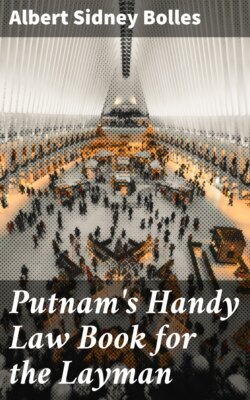Читать книгу Putnam's Handy Law Book for the Layman - Albert Sidney Bolles - Страница 7
На сайте Литреса книга снята с продажи.
FORMATION OF CORPORATIONS.
ОглавлениеFormerly charters were granted to corporations for a long term of years, or forever. The policy of the law has changed in this regard, and the duration of their existence is limited to a comparatively short period. The life of a national bank is only for twenty years; at the end of that period the charter is renewed, and the charters of the older national banks have been renewed several times. Perpetual charters are infrequently granted, and some of the older ones have been limited by legislative or judicial action. A private corporation had perpetual authority to build and maintain a bridge across the Susquehanna River at Harrisburg, nor could any other company build one within the distance of ten miles above or below. Notwithstanding this clear and exclusive grant, another company was formed which attempted to build a bridge within a mile of the other. The old company tried to prevent by law the new company from building the bridge. The court said that "perpetual" did not mean literally perpetual, but a long time, that the old company had enjoyed its exclusive grant a long time, long enough, and that the new company was justified in its undertaking.
A corporation has no heirs like an individual; it continues through succession, one sells his interest or stock to another, and thus it lives to the end of its charter unless it fails or, through some other event, comes to an end. Suppose a stockholder buys all the stock of the other members, does the corporation still exist? It does for a limited time. How long? No court has answered this question. It depends on the particular case. The courts also say, that he can sell his stock to other individuals and thus practically revive a dying corporation. A stockholder who had bought all the stock of a corporation claimed that he should be taxed as a corporation, which was at a lower or favored rate than that paid by individuals. The court said the game would not work, that for the purposes of taxation the concern must be regarded as an individual. So the stockholder knew more after that decision than he did before.
